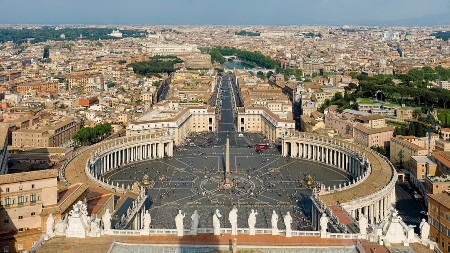 Dear readers, Catholic Online was de-platformed by Shopify for our pro-life beliefs. They shut down our Catholic Online, Catholic Online School, Prayer Candles, and Catholic Online Learning Resources—essential faith tools serving over 1.4 million students and millions of families worldwide. Our founders, now in their 70's, just gave their entire life savings to protect this mission. But fewer than 2% of readers donate. If everyone gave just $5, the cost of a coffee, we could rebuild stronger and keep Catholic education free for all. Stand with us in faith. Thank you. Help Now >
Dear readers, Catholic Online was de-platformed by Shopify for our pro-life beliefs. They shut down our Catholic Online, Catholic Online School, Prayer Candles, and Catholic Online Learning Resources—essential faith tools serving over 1.4 million students and millions of families worldwide. Our founders, now in their 70's, just gave their entire life savings to protect this mission. But fewer than 2% of readers donate. If everyone gave just $5, the cost of a coffee, we could rebuild stronger and keep Catholic education free for all. Stand with us in faith. Thank you. Help Now >
Fr. Randy Sly on the Parable of the Sower, and the Garden of the Heart
FREE Catholic Classes
In the parable of the sower, we learn a lot about the desire of God to offer to everyone to truth of the gospel. We see here a sower who sows everywhere. We could also call this the parable of the soils. So much of what we see here comes from spotlighting the condition of the soil that is receiving the seed.
Highlights
Catholic Online (https://www.catholic.org)
11/9/2015 (9 years ago)
Published in Living Faith
Keywords: holiness, parable, sower, soil, heart, evangelization, salvation, Fr. Randy Sly, ordinariate of the chair of St Peter
WASHINGTON, DC (Catholic Online) - Growing up in suburbia, I didn't know much about farming. My first real exposure to agriculture came while serving a parish in Manhattan, KS, the home of Kansas State University, which had one of the finest agricultural colleges in the country.
Some parishioners were faculty members at K State, so often agronomy, horticulture and other subjects often became the source of many illustrations when they taught in our religious education program. It was a wonderful learning experience for their pastor as well!
Our Lord takes full advantage of this motif on several occasions in bringing forth insights regarding our life in the Spirit. My all-time favorite - in fact, my "life verses," for lack of a better term - come from a vineyard, as Jesus teaches, "I am the vine, you are the branches."
Another powerful application is found in the Gospel parable commonly called the parable of the sower. The following passage is actually his explanation of the story:
Jesus said to his disciples:
"Hear the parable of the sower.
The seed sown on the path is the one who hears the word of the Kingdom
without understanding it,
and the Evil One comes and steals away
what was sown in his heart.
The seed sown on rocky ground
is the one who hears the word and receives it at once with joy.
But he has no root and lasts only for a time.
When some tribulation or persecution comes because of the word,
he immediately falls away.
The seed sown among thorns is the one who hears the word,
but then worldly anxiety and the lure of riches choke the word
and it bears no fruit.
But the seed sown on rich soil
is the one who hears the word and understands it,
who indeed bears fruit and yields a hundred or sixty or thirtyfold." (Mt. 13:18-23)
In the parable of the sower, we learn a lot about the desire of God to offer to everyone to truth of the gospel. We see here a sower who sows everywhere.
We could also call this the parable of the soils. So much of what we see here comes from spotlighting the condition of the soil that is receiving the seed. By way of analogy, this reveals much about the condition of the human heart at the time it receives the seed of God's gospel of love.
The Generosity of the Lord
First, we need to understand that God is extravagant when it comes to offering the seeds of the Gospel to the human heart. In the parable, the sower is throwing seed everywhere, even in places where the seed has little chance to grow.
One day, one of the K State "Ag" professors and I were talking about this. "This goes against everything that we teach today," he said matter-of-factly. "When you take a serious approach to farming economy, you want the most yield from the least amount of seed. You don't waste any. This really underscores how much God loves all of us!"
How true! Even those, whose hearts are overrun with weeds and deeds, are the subject of his love! We don't have to attain a certain standard of behavior first to receive what he wants to give us.
Pope Benedict said that this parable was autobiographical for Jesus; it was how he was already living out his mission and ministry. He stated, "God does not force us to believe in him, but draws us to himself through the truth and goodness of his incarnate Son. Love, in fact, always respects freedom."
The Freedom of the Heart
Freedom is a precious gift of God. As the Catechism states: God created man a rational being, conferring on him the dignity of a person who can initiate and control his own actions. "God willed that man should be 'left in the hand of his own counsel,' so that he might of his own accord seek his Creator and freely attain his full and blessed perfection by cleaving to him."
Man is rational and therefore like God; he is created with free will and is master over his acts.
Freedom is the power, rooted in reason and will, to act or not to act, to do this or that, and so to perform deliberate actions on one's own responsibility. By free will one shapes one's own life. Human freedom is a force for growth and maturity in truth and goodness; it attains its perfection when directed toward God, our beatitude.
As long as freedom has not bound itself definitively to its ultimate good which is God, there is the possibility of choosing between good and evil, and thus of growing in perfection or of failing and sinning. This freedom characterizes properly human acts. It is the basis of praise or blame, merit or reproach. (CCC 1730-1732)
With our freedom, however, we do have a price to pay. Not only can we choose evil, it is the inclination of our flesh. St. Paul emphasizes this in his Epistle to the Romans, "I see another law in my members, warring against the law of my mind, and bringing me into captivity to the law of sin which is in my members." (Rom. 7:23)
So we often find the garden of our heart overgrown with debris, weeds, thorns and rocks. There is little opportunity for the seed of God to grow! Dr. Marcellino D'Ambrosio, the director the lay apostolate Crossroads Initiative, gives us a perspective on how this seed is taking root in our Catholic soils today.
- Many who hear the gospel never seem to 'get it. The message is stolen before it ever takes root.
- Then there are the 50% of Catholic kids who receive the sacraments but disappear somewhere between age 18 and 35. Shallow roots fail to equip them to take the heat of our pagan culture.
- Then there are the 89% of lifelong, regular churchgoers who, according to George Gallup, have values and lifestyles identical to those of their pagan neighbors. Their faith has been neutralized by bad theology and worldliness so though they look like wheat plants, their religion is fruitless.
- Then there are those who stay out of serious sin, manage to do some good for some people, but all in all produce a mediocre harvest.
- Finally come the few who are not satisfied with just getting by. They sink their roots deep into Scripture, Tradition, prayer and the sacraments, and produce a bumper crop. We call these people saints.
Those observations should be depressing but at the same time challenging. The real burden today is not simply planting the seeds of the gospel in the human heart, but helping the garden of the heart to be ready to receive.
St. Josemaria Escriva wrote in "The Forge," "The sower went out to sow, to scatter the seed at all the crossroads of this earth. What a blessed task we have. We have the job of making sure that in all the circumstances of time and place the word of God takes root, springs up and bears fruit."
The Preparation of the Garden of our Heart
In the parable, we have a lot of different soil conditions with which to contend. We have the packed down path of the hardened heart; the rocky ground of those who have placed within other objects of delight; then, there's the thorny ground where the heart is overtaken by too many other distractions.
All of these are definite blocks to the reception of the gospel of love, and in the heart of one who does not have the grace of baptism or any background in spiritual issues, it can become an almost insurmountable object. Yet, the sower not only sows but continues to call out to those who have received the seed of the Word.
I'm reminded of the words of the Lord through the Prophet Isaiah, when He said, "I was sought by those who did not ask for Me; I was found by those who did not seek Me. I said, 'Here I am, here I am,' To a nation that was not called by My name. I have stretched out My hands all day long to a rebellious people, who walk in a way that is not good, according to their own thoughts.
We need to pray for those with overgrown or overcome hearts who we love. Often the stresses circumstances of life can problem a small clearing where a seed can actually germinate and take root. These divine moments can be opportunities to offer ourselves in the process of sowing, watering and reaping.
This parable also needs to be seen in the context of a believer who has allowed his heart to be compromised through the lust of the eyes, lust of the flesh and the pride of life. Confession is a blessing and gift to us in helping to return our hearts in readiness to receive.
St. Paul, in fact, gives us a great way to guide us in maintaining our garden. In Philippians, he shares words of encouragement in dealing with the stresses of life along with what I call a suitable catalog of adult Christian thinking.
Be anxious for nothing, but in everything by prayer and supplication, with thanksgiving, let your requests be made known to God; and the peace of God, which surpasses all understanding, will guard your hearts and minds through Christ Jesus.
Finally, brethren, whatever things are true, whatever things are noble, whatever things are just, whatever things are pure, whatever things are lovely, whatever things are of good report, if there is any virtue and if there is anything praiseworthy-meditate on these things. The things which you learned and received and heard and saw in me, these do, and the God of peace will be with you. (Phil. 4:6-9)
In sharing on this text during a homily in the summer of 2005, Blessed John Paul II ended with a prayer, calling upon the Lord's grace to make us ready to receive the seed of his Word:
Come, O Creator Spirit,
Visit the souls of those who belong to you;
Fill with your grace from on high
The hearts which you have made.
In this prayer we open our hearts, imploring the Spirit to fill them with light and life.
Spirit of God, make us ready to receive your visit. Make faith in the word which saves grow in us. Be the living source of the hope which blossoms in our lives. Be in us the breath of love which transforms us, and the fire of charity which impels us to give ourselves to the service of our brothers and sisters.
You whom the Father has sent, teach us all things and make us grasp the richness of the word of Christ. Strengthen our inner being, make us pass from fear to confidence, so that the praise of your glory may burst forth from us.
Be the light that fills people's hearts and gives them the courage to seek you unceasingly. You, Spirit of truth, lead us to the entire Truth, so that we may firmly proclaim the mystery of the living God who is active in our history. Enlighten us as to the ultimate meaning of this history.
Take away the unfaithfulness which separates us from you. Cast out from us all resentment and division. Make the spirit of brotherhood and unity grow in us, so that we may know how to build the city of man in the peace and solidarity that come from God.
Help us to discover that love is the most intimate part of divine life, and that we are called to share in it. Teach us how to love one another as the Father has loved us by giving us his Son.
-----
Father Randy Sly is a Catholic priest with the Personal Ordinariate of the Chair of St. Peter established by the Holy Father, Pope Emeritus Benedict XVI, through the Apostolic Constitution Anglicanorum Coetibus (On Groups of Anglicans). He is the Chaplain of the Common Good movement and Director of Pro-Life Activities for the Ordinariate. He is a popular speaker for parishes, apostolates and organizations.
---
'Help Give every Student and Teacher FREE resources for a world-class Moral Catholic Education'
Copyright 2021 - Distributed by Catholic Online
Join the Movement
When you sign up below, you don't just join an email list - you're joining an entire movement for Free world class Catholic education.

-

-
Mysteries of the Rosary
-
St. Faustina Kowalska
-
Litany of the Blessed Virgin Mary
-
Saint of the Day for Wednesday, Oct 4th, 2023
-
Popular Saints
-
St. Francis of Assisi
-
Bible
-
Female / Women Saints
-
7 Morning Prayers you need to get your day started with God
-
Litany of the Blessed Virgin Mary
Daily Catholic
 Daily Readings for Thursday, January 16, 2025
Daily Readings for Thursday, January 16, 2025 St. Fursey: Saint of the Day for Thursday, January 16, 2025
St. Fursey: Saint of the Day for Thursday, January 16, 2025 Prayer for a Blessing on the New Year: Prayer of the Day for Tuesday, December 31, 2024
Prayer for a Blessing on the New Year: Prayer of the Day for Tuesday, December 31, 2024- Daily Readings for Wednesday, January 15, 2025
- St. Paul the Hermit: Saint of the Day for Wednesday, January 15, 2025
- St. Theresa of the Child Jesus: Prayer of the Day for Monday, December 30, 2024
![]()
Copyright 2024 Catholic Online. All materials contained on this site, whether written, audible or visual are the exclusive property of Catholic Online and are protected under U.S. and International copyright laws, © Copyright 2024 Catholic Online. Any unauthorized use, without prior written consent of Catholic Online is strictly forbidden and prohibited.
Catholic Online is a Project of Your Catholic Voice Foundation, a Not-for-Profit Corporation. Your Catholic Voice Foundation has been granted a recognition of tax exemption under Section 501(c)(3) of the Internal Revenue Code. Federal Tax Identification Number: 81-0596847. Your gift is tax-deductible as allowed by law.









 Daily Readings for Thursday, January 16, 2025
Daily Readings for Thursday, January 16, 2025 St. Fursey: Saint of the Day for Thursday, January 16, 2025
St. Fursey: Saint of the Day for Thursday, January 16, 2025 Prayer for a Blessing on the New Year: Prayer of the Day for Tuesday, December 31, 2024
Prayer for a Blessing on the New Year: Prayer of the Day for Tuesday, December 31, 2024

